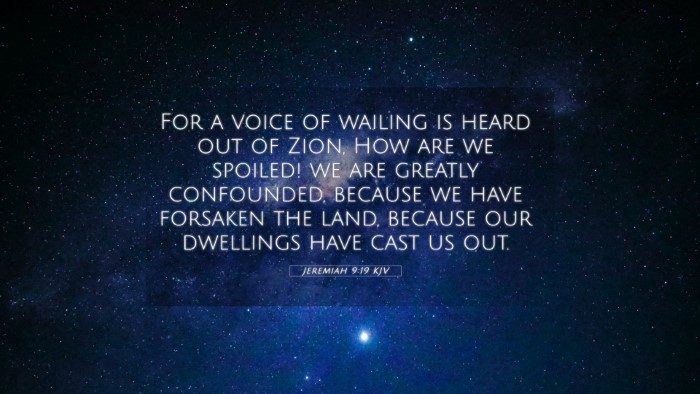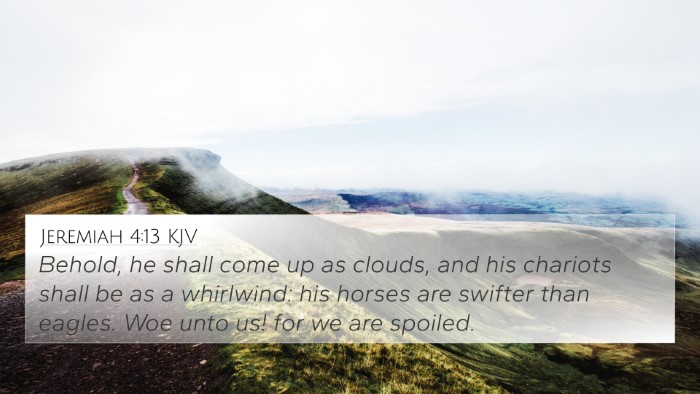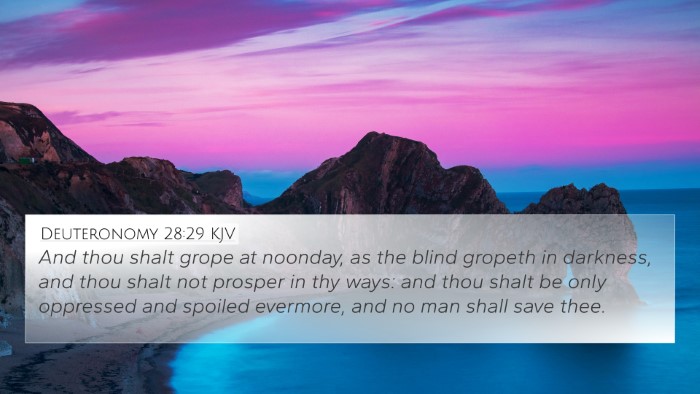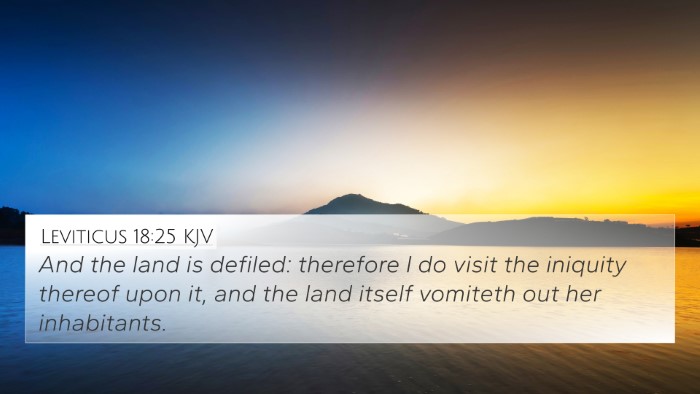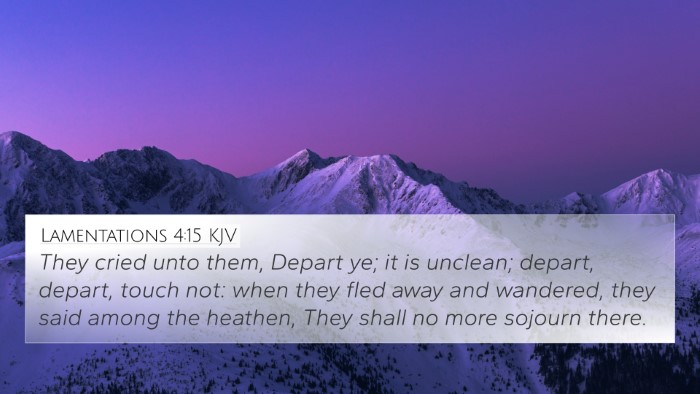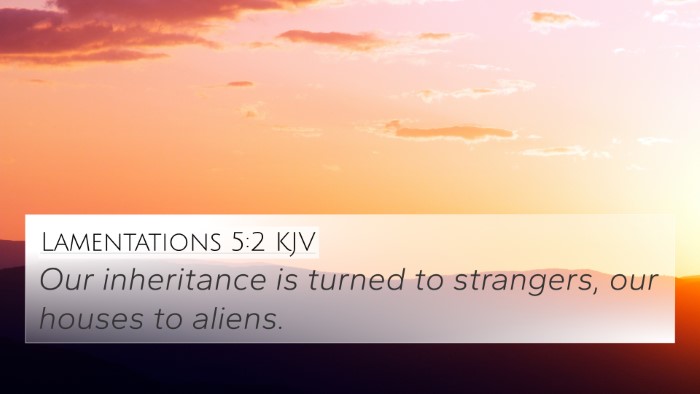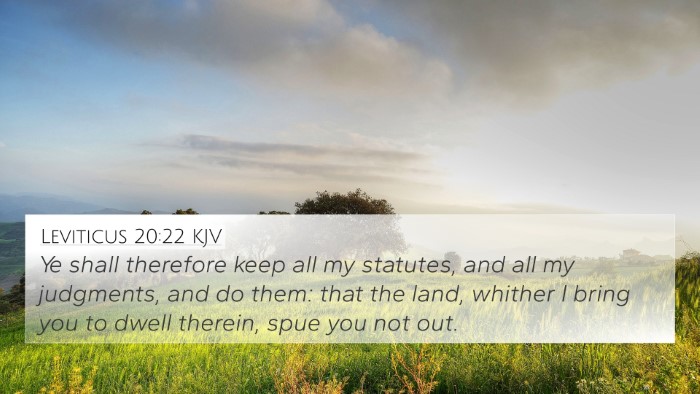Understanding Jeremiah 9:19
Verse: "For a voice of wailing is heard out of Zion, How are we plundered? We are greatly confounded, because we have forsaken the land, because our dwellings have cast us out."
Overview of the Verse
This verse from the book of Jeremiah depicts a moment of deep sorrow and lamentation for the people of Zion, representing Jerusalem and the nation of Israel. It captures feelings of loss, confusion, and regret, emphasizing the consequences of forsaking their homeland and, symbolically, their relationship with God.
Commentary Insights
-
Matthew Henry:
Henry notes that the verse reflects the devastation and despair experienced by the Judahites during their exile. He emphasizes the emotional pain involved, as the inhabitants not only mourn their physical loss but also their spiritual abandonment.
-
Albert Barnes:
Barnes discusses the importance of the voice of wailing as a significant symbol of pain. He stresses that the cry signifies a recognition of their plunder and destruction, serving as a wake-up call to the people about their choices. It accentuates the theme of divine judgment and the need for repentance.
-
Adam Clarke:
Clarke interprets this sorrowful tone as reflective of the broader work of the prophet. He underscores the prophetic role of lamentation in the face of sin and neglect of God’s covenant, aligning with the prophetic tradition of calling Israel back to faithfulness.
Thematic Connections
This verse can be tied into various themes within the Bible, notably concerning the consequences of sin and God's desire for reconciliation with His people. It parallels other narratives of lamentation and reflects the recurring cycle of disobedience and repentance illustrated throughout the Scriptures.
Bible Verse Cross-References
- Lamentations 1:1-2: This passage expresses similar mourning for the fallen state of Jerusalem.
- Isaiah 1:7: Highlights the desolation of the land due to the people forsaking their covenant with God.
- Ezekiel 33:10: Emphasizes the despair of the people in facing the repercussions of their actions.
- Jeremiah 4:20: Captures calls of alarm and the dire state of the people as a result of their transgressions.
- Joel 1:4: Another lament on the devastation affecting the land, calling for repentance.
- Psalm 137:1-4: Expresses the sorrow of the Israelites in exile, paralleling the sentiments in Jeremiah.
- Hosea 9:1: Warns about the consequences of straying from God's commands, showing a similar theme of regret.
- Micah 1:8-9: Illustrates the voice of lamentation over disaster due to sin.
- Zechariah 1:4: Calls the people to return to God following their abandonment of Him, resonating with the themes in Jeremiah.
- Matthew 23:37: Jesus laments over Jerusalem, drawing parallels with Jeremiah's heartache.
Insights Through Cross-Referencing
When studying Jeremiah 9:19, employing tools for Bible cross-referencing can enrich understanding. It’s beneficial to harness a Bible concordance or a Bible cross-reference guide to navigate these connections. For instance, the intertwining themes of lamentation found in both the Old and New Testaments reveal the deep rootedness of sorrow and the need for redemption.
As we explore these connections between Bible verses, we find a rich tapestry of themes woven throughout Scripture, underscoring God’s persistent call to repentance and the human experience of grief in the face of divine judgment.
Conclusion
Jeremiah 9:19 serves as a poignant reminder of the effects of forsaking one’s heritage and covenant relationship with God. The collective lament of the people reverberates throughout the Bible, reinforcing the idea of interconnectedness within the scriptural narrative. By understanding and reflecting on these Bible verse parallels, believers can gain a deeper grasp of their own faith journey and the continual call to return to God.
Further Study Recommendations
- Utilize cross-reference Bible study methods to delve deeper into related themes across different books.
- Explore detailed cross-reference studies between the Gospels and the prophetic literature.
- Identify how lamentations in the Psalms inform one’s understanding of prophetic messages, particularly in the context of exile.

